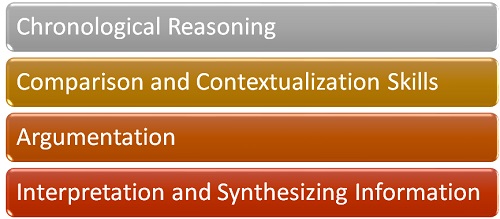Besides preparing you for one of the highest-paying social science careers, an undergraduate degree in history will help you cultivate certain valuable skills. In particular, there are four areas of historical thinking skill sets that are prized within this field of study. Becoming adept at chronological reasoning, comparison and contextualization, developing historical arguments backed by historical evidence and synthesizing and interpreting historical information will surely make you a better professional or amateur historian. These skills can also add value outside the field of history in a variety of industries and job roles.
Skills in Chronological Reasoning
Chronological reasoning is one of four types of skills used in historical thinking and encompasses the skills of historical causation, recognizing patterns of change and continuity and periodization. This means that you must be able to understand complex matters of cause and effect in historical events and processes. You have to be able to look at patterns over time to understand themes that recur throughout world and U.S. history. Finally, mastering the skills of chronological reasoning means being able to analyze and understand the various, and sometimes conflicting, models of how historians separate historical events into periods.
Beyond its importance in the study of history, a chronological reasoning skill set can be valuable in many other capacities. Being able to unravel all of the causes and effects of a complex issue in any industry is the first step toward solving that problem.
Comparison and Contextualization Skills
Skills in comparison and contextualization, sometimes referred to as making historical connections, revolve around comprehending history in a deeper way. Understanding the context of historical events helps to but understand the diverse and complicated set of factors that leads to that event.
This type of comprehension and connection goes deeper than causation in the sense that it aims to understand not just what happened to cause a major historical event but why the preceding actions or events occurred. Skills in comparing historical periods, events and impacts of a system or occurrence can help you understand how to historical happenings that share some similarities can have different effects.
When it comes to learning from history, contextualization skills are key. The precise motivations for the actions of historical figures may be different from those of public figures today, but the human factors underlying them, which provide context, are similar.
The Skills of Using Evidence to Craft (Historical) Arguments
IMAGE SOURCE: Pixabay, public domain
To contribute to the study of history, you need to be able to not just understand historical evidence but also analyze that collection of evidence to grasp – and develop your own – theories and arguments. An argument is only as compelling as the evidence behind it.
Argumentation matters in history because the subject isn’t all about names and dates. Much of the value of studying history comes from the theories that seek to explain the causes, effects and motivating factors that relate to a historical event. Although the facts of historical events, like those names and dates, may be widely known, historians can only theorize causation, consequences and motivation for the acts of historical figures who may be long gone or whose first-person accounts of the event may not be fully informed or completely reliable. Examining newly uncovered historical artifacts and documents, or re-examining known sources of historical evidence in light of new information, can help historians construct more plausible and detailed theories of how historical events came to pass.
Effective, evidence-backed argumentation is important not only to the study of history but to effectively addressing all kinds of issues in all fields. Truly solving problems means understanding data and constructing solutions based on that data.
Interpretation and Synthesis of Historical Information
How does a historian make meaning from numerous historical sources of information, which often disagree with each other? They need to develop the skills of interpreting and synthesizing that information. This means analyzing different types of documents, understanding the nuances between different perspectives (including their own present-day perspective) and constructing meanings that represent those nuances based on that historical information.
Historians who can interpret and synthesize information effectively understand that sources – whether primary documents written by historical figures or the writings of previous historians – are limited by the perspectives of their authors. They are able to wrap their heads around the reasons for contradictory information in these sources and to develop a thorough understanding of the historical period or event that encompasses even conflicting viewpoints.
In today’s world, information overload is a constant threat to productivity and decisive action. Being able to interpret and synthesize information is crucial regardless of whether you work in the field of history or in fields as different as business, medicine and teaching.
Additional Resources
What Are Some Career Opportunities for Me With a Degree in History?


